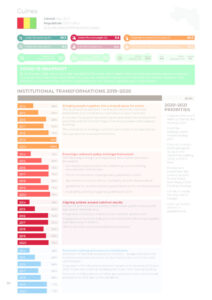Nutrition situation
Under five stunting (%)
30.3
Under five overweight (%)
5.6
Anaemia in women 15-49 years (%)
50.6
Under five wasting (%)
9.2
Low birth weight (%)
n.a.
0 to 5-month-old exclusive breastfeeding (%)
33.4
Adolescent overweight (%)
Male: 5.2
/ Female: 13
Adult overweight (%)
Male: 15.6
/ Female: 23.4
Adult obesity (%)
Male: 3.9
/ Female: 12
Adult diabetes (%)
Male: 6.8
/ Female: 6.1
COVID-19 snapshot
By 30 October 2020, the country had recorded 12,000 cases and 71 deaths. The Government adopted several measures, including travel restrictions and border closures, that resulted in disruptions to the food and nutrition systems. Care plans that incorporated the nutrition component into the national response were implemented.
Institutional transformations 2019-2020
Bringing people together into a shared space for action
The multisectoral platform’s Technical Committee has been established and coordination mechanisms have improved.A nutrition focal point has been appointed within the National HIV and AIDS and STI Control Programme and provided with capacitybuilding.
The multisectoral strategic nutrition committee is not operational.
Few partners are involved in nutrition.
Ensuring a coherent policy and legal framework
The following strategic and regulatory documents have been developed:
- standards and procedures for addressing and controlling micronutrient deficiencies
- COVID-19 nutritional management guidelines in 2020
- documents to ensure service continuity despite the pandemic
- guidelines for routine vitamin supplements at the community level • food safety and food hygiene guidelines in 2019
Aligning actions around common results
Review of primary and secondary information system tools (health, agriculture, livestock, etc.).Integration of nutrition indicators into national system tools.
Integration of nutrition indicators into the health information system, with data entry in DHIS 2.
DHIS 2 platform access extended to all partners.
Financial tracking and resource mobilisation
Allocation of financial resources to nutrition – budget allocation for nutritional activities accounts for less than 0.5 per cent of the total state budget.Proportion of funding for nutritional components between 2015 and 2019: 77 per cent external funding and 23 per cent internal funding.
Resource mobilisation round table (preparations have commenced) postponed to 2021 due to the pandemic.
2020-2021 Priorities
- Organise the round table to finance the strategic plan.
- Draft the strategic plan’s implementing plan.
- Carry out a socioanthropological study on the reasons for adding water to infant food.
- Finalise and implement the scaling-up plan for the Infant and Young Child Feeding Strategy.
- Conduct a study into the cost of hunger.
- Scale up routine vitamin A supplements.
Download

